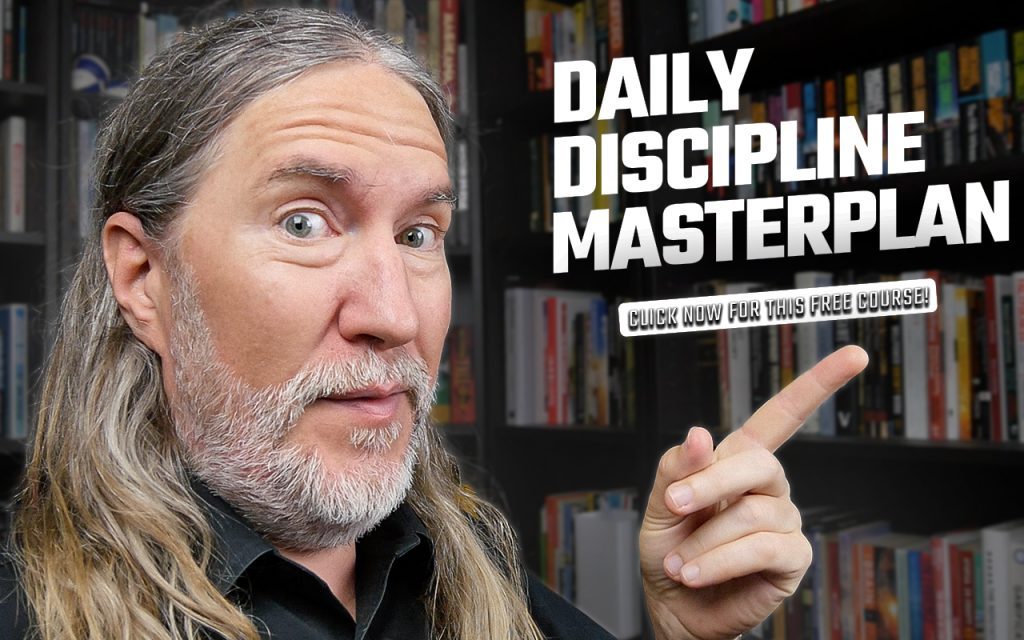If you’re anything like me, you’re ambitious. But you absolutely do not want to invite the mental noise that comes with making big things happen.
You know what I mean:
Hiring people only to deal with their diva tendencies and psycho dramas. (And have your own spiked…)
Dealing with troubling comments online.
Tackling the fears and uncertainties that come with doing anything ambitious.
It can be such a vicious circle.
Yet, that’s where personal mantras come in. They can neutralize the noise and set you free, at least most of the time.
I’ve been using them for years and I want to share my favorite examples.
Not only that, but I’ll let you know why I think they work.
Especially compared to the alternative “affirmations” cooked up by gurus who don’t know you. They probably don’t care about you much either.
Then there are the personal mantra generators. Do you really think a robot is going to pave your path to freedom?
Maybe… But it’s highly unlikely.
So if you’re ready for some of the most powerful personal mantras from my journey based on research and experience, let’s dive in.
I promise, I’m not a robot. Far from it!
What Is A Personal Mantra?
Mantra is a Sanskrit word that combines two ideas:
- Man = mind
- Tra = tool
A mantra is literally a tool of the mind.
There are many ways to use mantras, but to make them personal, you really want to cook up your own.
That, or you want to think deeply about why mantras you adopt from others belong in your mantra toolbox.
Mantras are different than quotes too, though you can conceivably turn quotes into mantras.
Although a mantra is designed to be repeated, often during a meditation session, I’ll share some personal mantra examples I repeat frequently as if conversation is itself a kind of meditation. Which it certainly can be.
Personal Mantras: 8 Powerful Examples
As we go through these examples, notice that they are variations on a theme.
They are all designed to focus attention on the truth of the present moment.
Not the mind trash.
Not the lack.
Not the need.
But on the pure glory of how this present moment operates as a form of Becoming what it will become.
Yes, Becoming with a capital B to emphasis the importance of studying the process, not the outcome. That’s another feature of these personal mantra examples I’m sharing with you today.
Let’s dive in.
One: It’s Just A Game
No, I don’t think life is really a game.
But much in life is analogous to gaming.
And if you’re into anything like Buddhism, Advaita Vedanta or the like, you’ve probably heard teachers in these fields describe life as a “zero sum game.”
Personally, I don’t know what “life” is in the first place. I think it’s pretty silly when people claim that they do.
Nietzsche also made this point in his stunning and hilarious 109th aphorism in The Gay Science.
So although I don’t think life is a game, I do often use the personal mantra, “It’s just a game.”
I have to use it often because otherwise, the crushing amount of defeat and impoverished results I face every day would discourage me out of showing up to the work.
And when you see it all us just a game, it helps remind you that there is fun to be had.
You just have to bring the right mental frame.
Two: It’s Only Numbers
A few years ago, YouTube started forcing you to look at your channel’s performance metrics.
I used to let it irritate me, especially since hardly a week goes by during which someone doesn’t post “you deserve millions of subscribers.”

I really appreciate when people say that, but as cool as it is when someone clicks a button, it becomes abstract when a platform turns it into arrows and numbers.
Maybe I do “deserve” more subscribers, but let’s call a spade a spade:
To see up arrows and down arrows next to piles of numbers week after week turns something I love doing into a job.
A “tyranny of metrics” as Jerry Muller puts it.
The Tyranny of Metrics
The truth is that these stats pretend to be “helpful” to me.
In reality, the metrics are designed to keep me thinking about how to make “better” videos to serve YouTube’s end goal, which is to keep people watching videos on YouTube for the purposes of displaying ads.
This is especially painful when my personal goal is not to have a goal, and yet the mechanics of the world force me to have them. Sure, I work on mini-projects and I give these deadlines, but in the context of my personal mantras, it’s all just a game.
Now, you can argue that it’s a collaboration that serves us both. And you can point out that I would look more favorably at the metrics if I could figure out how to work the algos better.
But the reality is that I just want to make videos and not think about how they “performed” at all. I’m the “happiness beyond thought” devotee, remember?
YouTube has been told by countless people that they feel forced exposure to metrics is unhealthy for them. “Creator burnout” is a term that even gets coverage on CNN.
My personal mantra in response to this constant exposure is simply, “it’s only numbers.”
Sometimes I use “numbers on a screen” as a variation.
It’s a simple personal mantra, but it helps me keep focused on the work and the joy of the journey. Not the outcome, which is a poisonous idea because…
Three: It’s Never Enough
I know, this sounds like a weird personal mantra.
It’s kind of an anti-mantra, truth be told.
And “it’s never enough” serves to remind me that it’s all just a game, and this game involves numbers on a screen.
Numbers are a trap, however. Let’s say you sell a million books. If you say that you’re happy with that, you’re probably deluding yourself.
For one thing, One million and one is better than one million for lots of reason. One more sale, one more person who will potentially actually read the thing, one more tickle of the algo system that will potentially grow the reach, blah blah blah.
Whenever I get into that kind of thinking, I pull out my anti-mantra: It’s never enough.
And it’s a good one because it can’t ever be enough. We live in a world governed by “growth” systems. Everything is always “numbers go up,” and until something changes, it’s never enough.
Keep in mind that this isn’t just a tyranny of metrics related to things like video views, sales and economic systems at large.
Even people at the gym are constantly talking about how you aren’t growing your strength if you aren’t adding more weight to your sets.
Maybe they’re right, I don’t know. But to avoid the mental wheel, I just remind myself, “It’s never enough.”
Sometimes even in a Yoda accent and grammar, “Never enough, it is.”
Four: Let Go Of The Outcome
One of my favorite long-form mantras is Upadesa Saram.
As one line runs:
The fruits of action are not everlasting and they cause one to fall into the great ocean of karma, blocking spiritual progress.
I highly recommend memorizing the Sanskrit version along with the English, which I teach you how to do in The Victorious Mind.
You notice certain things and make powerful connections when you commit this kind of material to memory so that it can be a personal mantra.
In this case, I thought that the Sanskrit phallum from phala for “fruit” was particularly interesting. It reminds me of the sound of the English word “fallacy.”
And to hang on to the outcome seems to me the ultimate fallacy because being is an emergent property. We are always becoming that which we will become.
As a result, we do so much harm to ourselves when we do not or cannot let go of the outcome. Of literally everything, which I believe is the healthiest thing you can do for lasting mental calm.
Five: Get Out Of My Sun
Have you hear the story of Alexander the Great and the philosopher Diogenes?
In brief, Alexander went to Diogenes and offered to grant him anything he wanted.
Diogenes looked up and said, “Get out of my sun.”
It turns out the great king had been casting shade over the philosopher who wanted nothing more than to bask in the light.
In response, Alexander said that if he could not be himself, he would want to be Diogenes.
Now, if you know your Greek philosophy, you’re already thinking about the Allegory of the Cave.
In that story, a slave manages to remove all kinds of barriers between himself and the sun, which represents absolute truth. Navigating out of the cave and into the light is a metaphor for how we all have to overcome obstacles and illusions in order to experience what is truly real.
Once the slave has access to the truth, he feels obliged to go back down into the cave and try to remove the barriers of those still enslaved by the barriers of illusion.
Diogenes was a cynic, however. He apparently felt no such need to do anything. Because if the truth is true, then it would also embrace the possibility that you don’t have to force the truth upon others.
Or, to circle back to the “it’s only numbers” mantra, you don’t have to “improve” what you’re doing by responding to this week’s stats. Not even if some user metric panel is giving you clues on how to do it.
Anytime something is tempting you to do something, you can try out this personal mantra example for yourself by silently saying, “Get out of my sun” and thinking about Diogenes.
Six: Warrior of the Mind
Tony Buzan used to call people who use memory techniques, “warriors of the mind.”
Of all the personal mantras I use, I think this one is the strongest because it focuses attention on the mental battle involved in doing good work in this world.
Indeed, Buzan even gave me a Warrior of the Mind pin for Outstanding Contributions to Global Mental Literacy. I’m sure he gave it to me as means of making the mantra physical. Something I could touch and feel so I wouldn’t forget the importance of the mission.

What doesn’t it mean to be a Warrior of the Mind and use this term as a personal mantra?
Well, for one thing, you can’t tip-toe through the grass. Yet you have to be nimble on demand so you’re silent when necessary.
You can’t turn the other cheek, because to do so allows others to slap you from all sides. Yet, you need to know when winning the battle leads you to losing the war.
So a true warrior of the mind is like a samurai who is always prepared to execute one final perfect move, even with his head cut off.
That’s how the samurai in Jarmusch’s Ghost Dog puts it. Another wonderful personal mantra
Seven: Personal Mantras For Negation
Of all the personal mantras I’ve borrowed or cooked up on my own, none have been better than the ones I shared in this TEDx Talk:
Now you might be thinking…
Hang on! How can questions be mantras?
Well, as I discussed in the talk, I memorized the material a bit too quickly. What I memorized wasn’t actually questions.
But it was a happy little accident because those questions create meta-cognitive opportunities to explore Becoming.
The questions are:
- How do my thoughts behave?
- Are my thoughts useful?
Now, a lot of people have asked me what the “behave” question means.
It’s simply a method of using a mantra to generate ideas and labels that help you dismiss unwanted thoughts. You might notice that your thoughts are childish, locked in scarcity, bitter or sometimes even have positive characteristics.
Either way, this personal mantra helps you get insight into what’s happening in your mind.
But as we’ve seen, insight can lead to a tyranny of metrics. So you want to practice observing the thoughts, questioning them, labelling and then letting them go.
The emphasis here is on practice. As long as you have a brain in play, it’s probably going to come back to thoughts that you’d rather not have. That’s why a “warrior of the mind” keeps every mental tool sharp and close at hand.
Eight: I Am Not My Mind
The Nirvana Shatakam has a lovely line at the beginning:
“I am not the mind.”
It’s a negation mantra that progressively eliminates everything to help you use the mantra to cut to the core of Becoming itself.
You can apply it to your darkest thoughts and use it as part of journaling and any number of personal development activities.
The trick is to practice this personal mantra consistently enough to usher it into procedural memory. That way, it will come up naturally without you having to consciously trigger it.
It can feel disorienting to negate your mind and your body, so if you find yourself in distress, this organization can help you. I found myself at a loss for a short while myself after starting with mantras like these, and probably would have benefitted from a quick chat with someone who’d been there before.
How to Create Your Own Personal Mantras
Perhaps “create” is the wrong word.
The more you grow as a person, the more you realize that you’re drawing upon resources and ideas that exist long before you arrive.
In the case of mantras, the language preexists you down to each letter of the alphabet.
And all the major ideas have already been discovered and are just waiting for you to dive into them.
That’s not to say new things won’t emerge.
But when you start to experience the world as “pure” Becoming, you realize that you’re deeply entangled with the process.
So you really don’t have to “create” your own personal mantras. You can borrow them, make them your own by memorizing them, and when cool thoughts come to your mind, you can start putting them to use.
I don’t know if “it’s only a game” and “numbers on a screen” are something I cooked up spontaneously, or come to me as some form of cryptomnesia.
It doesn’t really matter.
What matters is using what is useful and then allowing things that aren’t useful to float away. And if you can’t get them to float away, then practice letting go of the intended outcome.
Extended use of personal mantras will show you sooner or later that you weren’t in control anyway.
The Ultimate Truth About Personal Mantras
I realize that can sound defeatist or even nihilistic, but I disagree.
Control is potentially an option, and perhaps some mantras can give it to you.
But even if you could get it, would you really want it?
After all, as William S. Burroughs cleverly observed, control seeks to control control. It’s an endless cycle.
And the world is filled with parodoxes and puzzles, like the one about God being so powerful he can create an object so heavy he can’t even lift it… negating his own supposed powers.
Personally, I think Diogenes was right. Control is a distraction, as are intellectual puzzles.
So perhaps the best personal mantra of them all really does belong to him and his surely proverbial story:
“Get out of my sun!”
Thanks for reading, and if you enjoyed this post and would like more, grab my free Daily Discipline guide and video masterclass:


